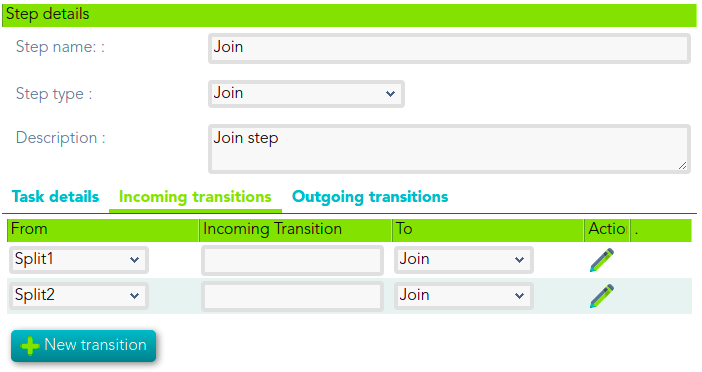Join
Definition
This step is used to combine two or more parallel paths into one path.
Steps Tabs
Task details
&&TODO&&This Faltaprocess untype parametrodoes ennot Taskhave detailtask details for the fork step.
Incoming transitions
The Incoming transitions tabs show the previous steps where the flow comes from. When you create a process from a template or from scratch default incoming transitions are defined. It is allowed to customize the default set up, add new transitions or delete transitions.
To join some paths will be mandatory to add the incoming transitions from those forks.
- From: the previous step, where the flow come. Allows you to select where the workflow comes from.
- Incoming transition: brief name to identify the transition. That is the name of the action the form will show to the final user.
- To: current step.
- Action: allows creating a custom script to perform specific actions.
Example
Delete additional attribute:
userName = executionContext.getVariable("userName");
attribute = serviceLocator.getUserService().findDataByUserAndCode(userName, "country");
if (attribute != null) {
serviceLocator.getAdditionalDataService().delete(attribute);
}Outgoin transitions
The Outcoming transition tab shows the next steps where the flow can go from the current step. When you create a process from a template or from scratch default outcoming transitions are defined. It is allowed to customize the default set up, add new transitions or delete transitions.
- From: current step.
- Incoming transition: name of the transition.
- To: the next step, where the flow go.
- Action: allows creating a custom script to perform specific actions.
When you create an outcoming transition, Soffid creates the proper incoming transition.
Example
Scroll through the list of roles to execute some actions.
userName = executionContext.getVariable("userName");
roleList = serviceLocator.getApplicationService().findRolesByUserName(userName);
for (role:roleList) {
//TO-DO
}

